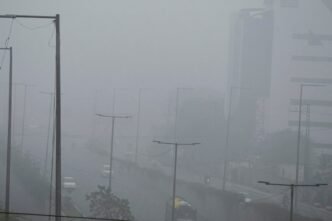Pakistani authorities introduced mobile clinics and added more beds in hospitals to treat the nearly 70,000 patients received daily with respiratory-related diseases as hazardous smog continued to shroud the country’s east, officials said Wednesday.
Punjab, Pakistan’s most populous province with 127 million residents, has been hit by a record-high ongoing wave of pollution since October. The U.N. children’s agency on Monday warned that the health of 11 million children there was at risk.
Lahore and Multan, the province’s two main cities hit by smog, remained the two most polluted cities in the world on Wednesday, with air quality index readings of about 400, according to the Environmental Protection Department. Anything over 300 is considered hazardous to health.
The dangerous smog is a byproduct of large numbers of vehicles, construction and industrial work as well as burning crops at the start of the winter wheat-planting season, experts say.
Meanwhile, more than 200 clinics on board vehicles have been roaming the smog-hit province of Punjab since last week in search of people who can’t afford treatment and the elderly who can’t make it to hospitals, a top government official at the Health Department, Aun Abbas, said.
Abbas said the mobile clinics are equipped to handle basic laboratory tests and doctors onboard can prescribe medication as needed.
Uzma Bukhari, a spokesperson for the Punjab provincial government, said more than 2.1 million patients affected by smog have so far been treated at state-owned hospitals, adding the number is expected to grow.
Schools in the province have been ordered to shut down until Nov. 17, to protect children, and all parks and museums until Nov. 18. Doctors have urged people to avoid unnecess travel and wear face masks.
“Most patients with respiratory-related diseases are coming to hospitals because they did not wear face masks,” said Azam Mushtaq, a medical specialist at Nishtar Hospital in Multan told The Associated Press.
Asthma patients seemed to suffer the most as they had a hard time breathing even after being admitted and provided with oxygen support, according to an AP reporter on the scene.
However, many violate the mask mandate and are being fined by authorities. Traffic police also penalize drivers whose vehicles emit smoke.
Weather forecasters predict light rain in some of the areas in Punjab, which can help improve air quality. The government has also said it is looking into methods to induce artificial rainfall to combat the pollution in Punjab.
___
Associated Press writer Babar Dogar contributed to this report from Lahore, Pakistan.













